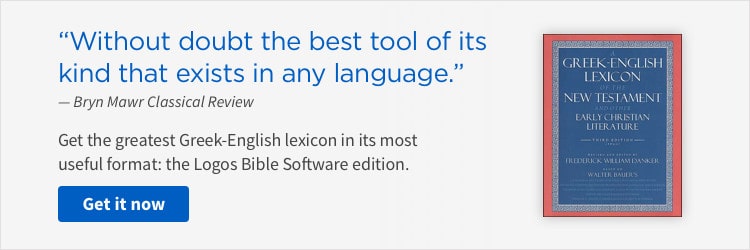In their book Across the Spectrum: Understanding Issues in Evangelical Theology, Gregory Boyd and Paul Eddy discuss the inerrancy of Scripture and explore one of the core distinctions of evangelical theology: “the conviction that the Bible is the inspired Word of God” (2 Tim 3:16–17).1 And closely related to biblical inspiration is the long-held evangelical claim that the Bible is the final authority on faith and practice.
Despite this claim, disagreement exists among evangelicals concerning certain differences in Scripture—like why the fourth Gospel’s record of Jesus’ activities while on earth differs so much from the other three and why resurrection details in the Gospel accounts don’t match down to the last jot and tittle. For some, these differences are enough to land respected theologians on one side or the other of the Bible-is-historically-accurate fence.
Thus was born in the 1970s the biblical inerrancy debate (more on this below), which has led to two perspectives on whether the Bible is inerrant on all matters: infallibility and inerrancy. And though they are sometimes used interchangeably, there is a slight distinction between the two.
First, the more recent view.
The Infallibilist View
The word “infallible” means “will not fail” or “trustworthy.” So to say Scripture is infallible signifies its full trustworthiness “as a guide that is not deceived and does not deceive.”2 Infallibility does not mean the Bible cannot contain errors—but rather that it cannot fail.
In Christian Thought: Orthodoxy and Heresy, Beth Felker Jones says the concept of infallibility means that the Word of God “will do what God intends for it to do” for his expressed purpose.3
In this way, the Word of God is not capable of erring.
Those who adhere to this view point to 2 Peter 1:19–21 as evidence that the Bible itself claims infallibility:
And we have the prophetic word more fully confirmed, to which you will do well to pay attention has to a lamp shining in a dark place, until the day dawns and the morning star rises in your hearts, knowing this first of all, that no prophecy of Scripture comes from someone’s own interpretation. For no prophecy was ever produced by the will of man, but men spoke from God as they were carried along by the Holy Spirit.
God is infallible—there is no error in him. Therefore, the Word he “breathed out” (2 Tim 3:16–17) is infallible too.
Thus, this view (which gained traction in the nineteenth and twentieth centuries in response to a modernization movement in the Church) posits the Bible can and should be trusted as unfailing “in all matters that pertain to Christian faith and practice,”4 but it should not be considered without error regarding minor matters of history or science.
The inerrantist view
In contrast, the inerrantist view goes further, holding that Scripture is free from error of any kind—or as defined in the Chicago Statement on Biblical Inerrancy, “free from all falsehood, fraud, or deceit.”5
The inerrantist view thus makes a strong claim about the truth and reliability of the Bible—that it (the original autographs—not copies) is without error in all matters it addresses, including history and science. Proponents admit there are apparent errors6 (and agree we should try and account for them when possible) but say any errors aren’t real errors—they simply fall into the category of “things our finite minds cannot explain,”7 are phenomenological,8or are a translation error.
However, Dr. Robert Plummer, Professor of Biblical Studies at Southern Seminary, says even translation errors, confusing nuances, or printing errors that are revised over time are “not an error in the Scripture but in the translation of the Scripture.”9 The many excellent translations of the Bible, Plummer says, means the Bible is accurate “insofar as it accurately conveys the wording of the underlying Greek and Hebrew text.”9 In other words, as Mark Ward writes, “Only the apostles were divinely inspired; translators are not. That’s why no translation ever achieves perfection. Perfection is an unattainable ideal unless a Perfect Being is involved.”
That’s why proponents of this view say it is incorrect to identify the Bible as the root problem of a discrepancy rather than our understanding of it.7
Inerrantists believe Jesus held this view and point to the following passages:
For truly, I say to you, until heaven and earth pass away, not an iota, not a dot, will pass from the Law until all is accomplished. (Matt 5:18; see also Luke 16:17)
Scripture cannot be broken. (John 10:35)
All Scripture is breathed out by God and profitable for teaching, for reproof, for correction, and for training in righteousness. (2 Tim 3:16)
If God is perfect and cannot err, and if he inspired Scripture, and if what God breathes retains his perfect character, then Scripture, according to this view, cannot err either.10
Dr. Plummer adds that Christians who believe in inerrancy say the biblical writers themselves claim biblical writings to be uniquely authoritative and true—and that the Word itself affirms this in Numbers 23:19:
God is not man, that he should lie, or a son of man, that he should change his mind. Has he said, and will he not do it? Or has he spoken, and will he not fulfill it?
The inerrantist view, Plummer says, goes back to the inception of the Church and was held until the Enlightenment in the 1600s, when Christians began to question whether the Bible was completely truthful.9
For example, early Church fathers like Clement of Rome (AD 300–100), Justin Martyr (AD 100–165), Tertullian (AD 160–226), and Augustine (AD 354–430) championed this view—that the Bible is inerrant in historical and scientific matters as well as redemptive matters.11 For example, Augustine wrote:
For I confess to your Charity that I have learned to yield this respect and honor only to the canonical books of Scripture: of these alone do I most firmly believe that the authors were completely free from error. —Augustine
Finally, this view sees inerrancy as the bedrock for all other Christian doctrines.12
The inerrancy debate
Some theologians affirm the infallibility of Scripture but not the inerrancy of it, “intending thereby to indicate that the Bible can be relied on as an authority in matters of faith and practice while recognizing the possibility of scientific and historical errors.”13 Inerrantists pushed back against such skeptics of Scripture’s authority, birthing what is known as the “modern inerrancy debate” between 1900 and the 1920s, which developed more fully in the 1970s. It has become one of the more hotly debated topics in the evangelical world.
Views on the inerrancy of Scripture
Today, a spectrum of evangelical positions exists on inerrancy. (In recent years, some notable evangelical scholars who have been historically inerrantist have expressed views inconsistent with a belief in the historic definition of inerrancy, which has deeply concerned staunch inerrantists and turned up the heat on the discussion.)
Five Views on Biblical Inerrancy (part of the Counterpoints Series) showcases these positions on the inerrancy of Scripture to help facilitate understanding of these perspectives, particularly where and how they diverge. A diverse assortment of influential scholars and theologians—including R. Albert Mohler Jr., Peter Enns, Michael F. Bird, John R. Franke, and Kevin J. Vanhoozer—compare and critique multiple distinct views in an effort to open lines of communication on the subject.
In addition to the volume on inerrancy, The Counterpoints Series includes essays on tricky (and sometimes heated!) topics like baptism, creation and evolution, eternal security, and the apostle Paul—all penned by distinguished theologians and pastors.
Get multiple views on the trickiest doctrines now.
Related posts
- 7 Key Elements of the Doctrine of Scripture
- What a 400-Year-Old Bible Preface Can Teach Us about Translations
- Barth, Val Til, and Calvinism
- See How All Major Doctrines Relate to Each Other
Related resources
- Vital Issues on the Inerrancy Debate by Norman Geisler, et al.
- Crossway Studies on Inerrancy (5 vols.) by G. K. Beale, et al.
- Defending Inerrancy: Affirming the Accuracy of Scripture for a New Generation by Norman Geisler
- What You Should Know about Inerrancy by Charles Ryrie
- Gregory Boyd and Paul Eddy, Across the Spectrum: Understanding Issues in Evangelical Theology (Baker Academic, Grand Rapids, MI, 2009), 15.
- J. I. Packer, et al. New Dictionary of Theology, “Infallibility” (InterVarsity Press), 1988.
- Beth F. Jones, Christian Thought: Orthodoxy and Heresy (Lexham Press, Bellingham, WA), 2016
- Gregory Boyd, Spectrum,19.
- The International Council on Biblical Inerrancy (ICBI) held a conference in October 1978, where over 300 evangelicals representing 41 churches and 38 different denominations—including John F. MacArthur, Francis Schaeffer, and J. I. Packer—signed a document that addresses the inerrancy of Scripture and reliability of the biblical text. This document is helpful for understanding the doctrine of biblical inerrancy and how it impacts Christian life.
- Over time typos, mistranslation, and copying mistakes have led to human error. Because of this, inerrancy concerns only original documents.
- Gregory Boyd, Spectrum, 18.
-
Literally, “the science of phenomena in different senses and in various ways in philosophy, psychology, sociology and religious studies.” J. I. Packer et al., New Dictionary of Theology, “phenomenology” (InterVarsity Press), 1988.
- https://www.youtube.com/watch?v=UT5zYw1qaaM
- Gregory Boyd, Spectrum, 10.
- https://defendinginerrancy.com/a-seismic-shift-in-the-inerrancy-debate/
- Norman L. Geisler, et al. Vital Issues in the Inerrancy Debate (Wipf and Stock, 2016), ch. 2.
- Steven Evans, Pocket Dictionary of Apologetics and Philosophy of Religion, “Infallibility” (InterVarsity Press), 2002.








